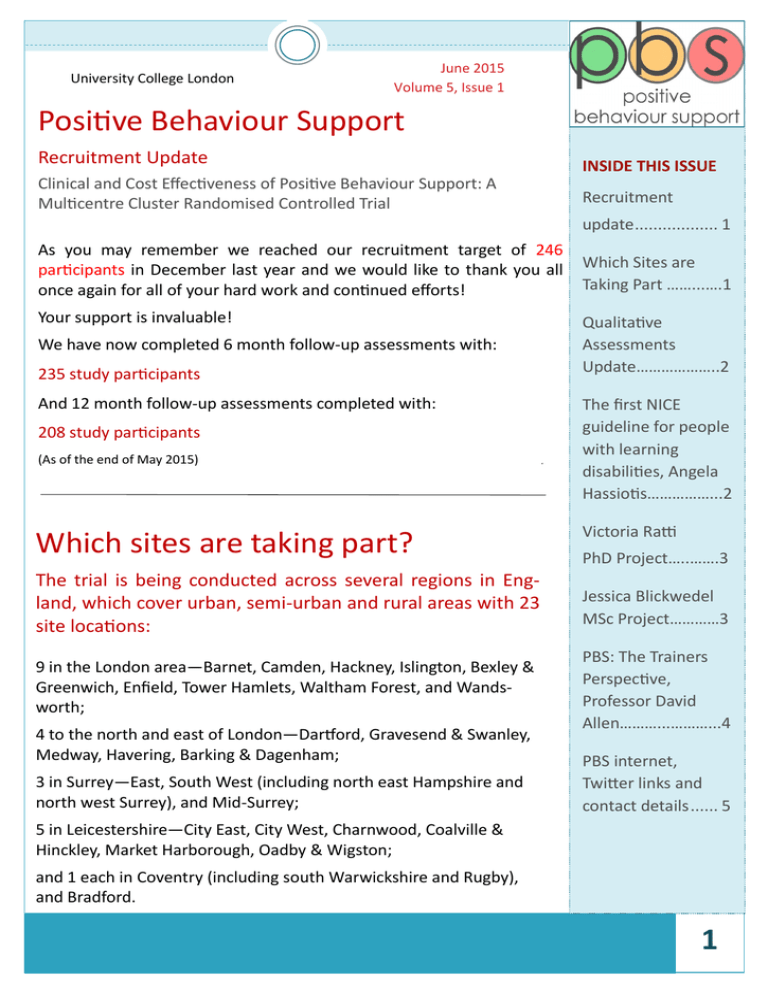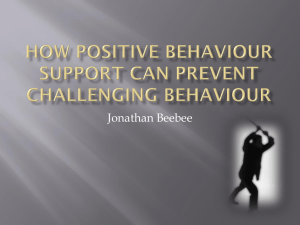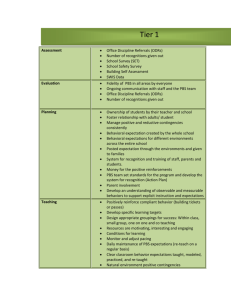Positive Behaviour Support Recruitment Update
advertisement

University College London June 2015 Volume 5, Issue 1 Positive Behaviour Support Recruitment Update INSIDE THIS ISSUE Clinical and Cost Effectiveness of Positive Behaviour Support: A Multicentre Cluster Randomised Controlled Trial Recruitment update .................. 1 As you may remember we reached our recruitment target of 246 participants in December last year and we would like to thank you all once again for all of your hard work and continued efforts! Your support is invaluable! We have now completed 6 month follow-up assessments with: 235 study participants And 12 month follow-up assessments completed with: 208 study participants (As of the end of May 2015) Which sites are taking part? Which Sites are Taking Part ……...….1 Qualitative Assessments Update………………..2 The first NICE guideline for people with learning disabilities, Angela Hassiotis……………...2 Victoria Ratti PhD Project…..…….3 The trial is being conducted across several regions in England, which cover urban, semi-urban and rural areas with 23 site locations: Jessica Blickwedel MSc Project…………3 9 in the London area—Barnet, Camden, Hackney, Islington, Bexley & Greenwich, Enfield, Tower Hamlets, Waltham Forest, and Wandsworth; PBS: The Trainers Perspective, Professor David Allen………...………...4 4 to the north and east of London—Dartford, Gravesend & Swanley, Medway, Havering, Barking & Dagenham; 3 in Surrey—East, South West (including north east Hampshire and north west Surrey), and Mid-Surrey; PBS internet, Twitter links and contact details ...... 5 5 in Leicestershire—City East, City West, Charnwood, Coalville & Hinckley, Market Harborough, Oadby & Wigston; and 1 each in Coventry (including south Warwickshire and Rugby), and Bradford. 1 Qualitative Assessment Phase Update We have now started the qualitative assessment phase of the PBS study. In this part of the project, we are interviewing service users, their paid or family carers, volunteer staff members and service managers to get some feedback about the intervention and the study. Interviews are audio-recorded. We have thus far interviewed 8 managers, 8 volunteer staff members, 5 service users, 3 paid carers and 1 family carer and we are arranging further interviews for the months to come. In order to gather more relevant information from interviewees, in our qualitative interviews we are using different sets of questions across groups and in the case of service users, we are using individualised questions based on personalised PBS plans. By applying this person-centred approach, we ensure that the personal views of each service user are valued. Alessandro Bosco The first NICE guideline for people with learning disabilities The first NICE guideline for people with learning disabilities NG11 “Challenging behaviour and learning disabilities: prevention and interventions for people with learning disabilities whose behaviour challenges” has now been published (https://www.nice.org.uk/guidance/ng11). As a member of the guideline development group chaired by Professor Glynis Murphy, I would like to assure everyone that great care was taken to hear all stakeholders’ opinions. We had a lot of support from experts in systematic reviews and meta-analysis and we heard evidence from other researchers as well as parents of people with learning disabilities whose behaviour was challenging. It was disappointing to have so little evidence available for medications and psychosocial interventions that could be used to inform what clinicians and other professionals should do but I believe that some steps have been described that put together and implemented can begin to enhance the standards of care for this important group of people with learning disabilities. Positive Behaviour Support has emerged as the desired framework for managing behaviour that challenges in ordinary practice and medication can only be one of a number of approaches that can be delivered. There is a lot that needs to be done and community learning disability teams must look at their practice and decide whether they are compliant with the guideline recommendations and if not how they may address gaps in skills and provision of social support. I hope that one of the legacies of the guideline will be the reduction in variability of care standards across community services and the overall reduction in inpatient care as the default position of managing people with learning disabilities whose behaviour challenges. Angela Hassiotis Chief Investigator PBS study 2 Victoria Ratti - PhD project As well as being a research assistant on the PBS study I am also a part-time PhD student and I am currently conducting a project investigating whether in people with intellectual disabilities there is any relationship between challenging behaviour and different care and support environments. It is thought that 10-15% of people with intellectual disabilities display some form of challenging behaviour. Although there are certain characteristics that will make some individuals more likely to display challenging behaviour, for example being male or having a diagnosis of autism, it is generally accepted that challenging behaviour is also influenced by individuals’ environments, which can include the material environment (e.g. the home), the opportunities that are available to them and the people that surround them, such as friends, family and paid carers; for my project I want to investigate whether there are certain characteristics in individuals’ environments that may be more likely to predict challenging behaviour in adults with intellectual disabilities, but for the purpose of my study I am only focusing on people who live in the community and are supported by paid carers, rather than family carers. In order to carry out my project I am contacting paid carers who have previously taken part in the PBS study and asking them to complete a further set of questionnaires in relation to the environment in which they work in and the care they are able to provide. These additional data will then be analysed in conjunction with the data on challenging behaviour already collected during the PBS study and it is hoped that the study will give us some insight on what aspects of care may help predict the occurrence of challenging behaviour in people with intellectual disabilities. Jessica Blickwedel - MSc Project I am one of the Research Assistants on the PBS study. For my MSc project I will be looking at epilepsy in adults with intellectual disability and challenging behaviour. Epilepsy and challenging behaviour are both highly prevalent in the intellectual disability population and it is thus crucial to understand any possible associations between the two. While there has been some previous research in this area, the findings are somewhat conflicting and there is a paucity of evidence which considered epilepsy in people with clinically relevant challenging behaviour or on specific epilepsy related factors within the epilepsy group. Therefore for this study I am looking to identify any such potential relationship between the presence of epilepsy or epilepsy-specific predictors and challenging behaviour, subtypes of challenging behaviour and psychiatric disorder. In addition I will also consider the relationship between epilepsy and carer burden in both paid and family carers. I will be using the data we collected for the baseline assessment of the PBS study comprising of validated measures of challenging behaviour, psychopathology, carer burden and psychometric intellectual disability assessments. At the moment I am also in the process of contacting the carers of all those PBS study participants who were recorded as having epilepsy during their initial assessment to gather further information of seizure type, age epilepsy onset, recent epilepsy related hospitalisation, episodes of status epilepticus and on which health care professionals manage the person’s epilepsy. Data collection should be completed by mid to end of June. 3 PBS: The Trainers’ Perspective The combined career PBS experience of the team (Mark Smith, Gill Nethell, Edwin Jones and myself) delivering the training intervention in this project must total over 50 years. Unfortunately I account for at least 50% of that total but this gives me a good vantage point from which to view our involvement in the present study! This has been an interesting project to work on from a number of different perspectives. First, the study was delivered in post-Winterbourne policy context that placed great emphasis on the role of PBS in providing effective services for people who challenge. Second, the project sought to apply a methodology (the randomised control trial) to an area of work that has historically be founded upon the single-case study. Third, the participating staff group were mostly made up of practitioners who would not traditionally be charged with delivering PBS interventions. Fourth, we were attempting to skill up these practitioners in (mostly) unfamiliar skills and over a relatively short period of time. From our perspective, this meant that the project was about the efficacy of training unfamiliar community support team staff in a short course of PBS; it was not about the effectiveness of PBS per se-an important distinction that will form part of the study discussion I’m sure. Our input was to train participants over three two-day workshops in a level of functional assessment and intervention that was designed to enable them to respond to behavioural challenges of medium severityour perspective being that people with more severe challenges would require a greater resource input than available within the confines of the present project. The response to the workshops was really positive and participants clearly engaged with the tasks at hand. Participants completed assessments and plans between workshops and we also provided mentoring support for two complete cases post-training. Participants were therefore able to be guided through applying the skills learnt in the classroom in actual clinical practice. Through the mentoring process, we became aware of a variety of constraints that impacted upon participants’ abilities to implement the PBS model. These, along with things like individual participant’s use of mentoring opportunities, will undoubtedly impact on the outcomes achieved for the service users involved. As part of the qualitative aspect of the study, we had the opportunity to meet with the research team and map out in detail what we think these constraints (and potential solutions) were. We feel that this in itself is likely to provide invaluable information in the quest to deliver the service-wide focus on PBS that current policy requires. Would we do it differently if we were doing it again? Some tweaking of the training would undoubtedly take place, but overall we feel that the approach was pretty spot on. What would be different is the attention paid to some of the contextual variables likely to mediate the impact of the PBS training at the outset. We are therefore now eagerly awaiting the results and perhaps helping translate some of the organisational lessons learnt into practice. Professor David Allen Positive Response Training & Consultancy and The Tizard Centre, University of Kent 4 The PBS website: www.ucl.ac.uk/positive-behaviour-support Twitter account: www.twitter.com/PBSstudy University College London Division of Psychiatry 6th Floor Maple House 149 Tottenham Court Road London W1T 7DN Phone: 020 7679 9311 a.hassiotis@ucl.ac.uk m.poppe@ucl.ac.uk v.ratti.11@ucl.ac.uk j.blickwedel@ucl.ac.uk christopher.anderson@ucl.ac.uk The PBS study is funded by the National Institute for Health Research HTA Programme 5




